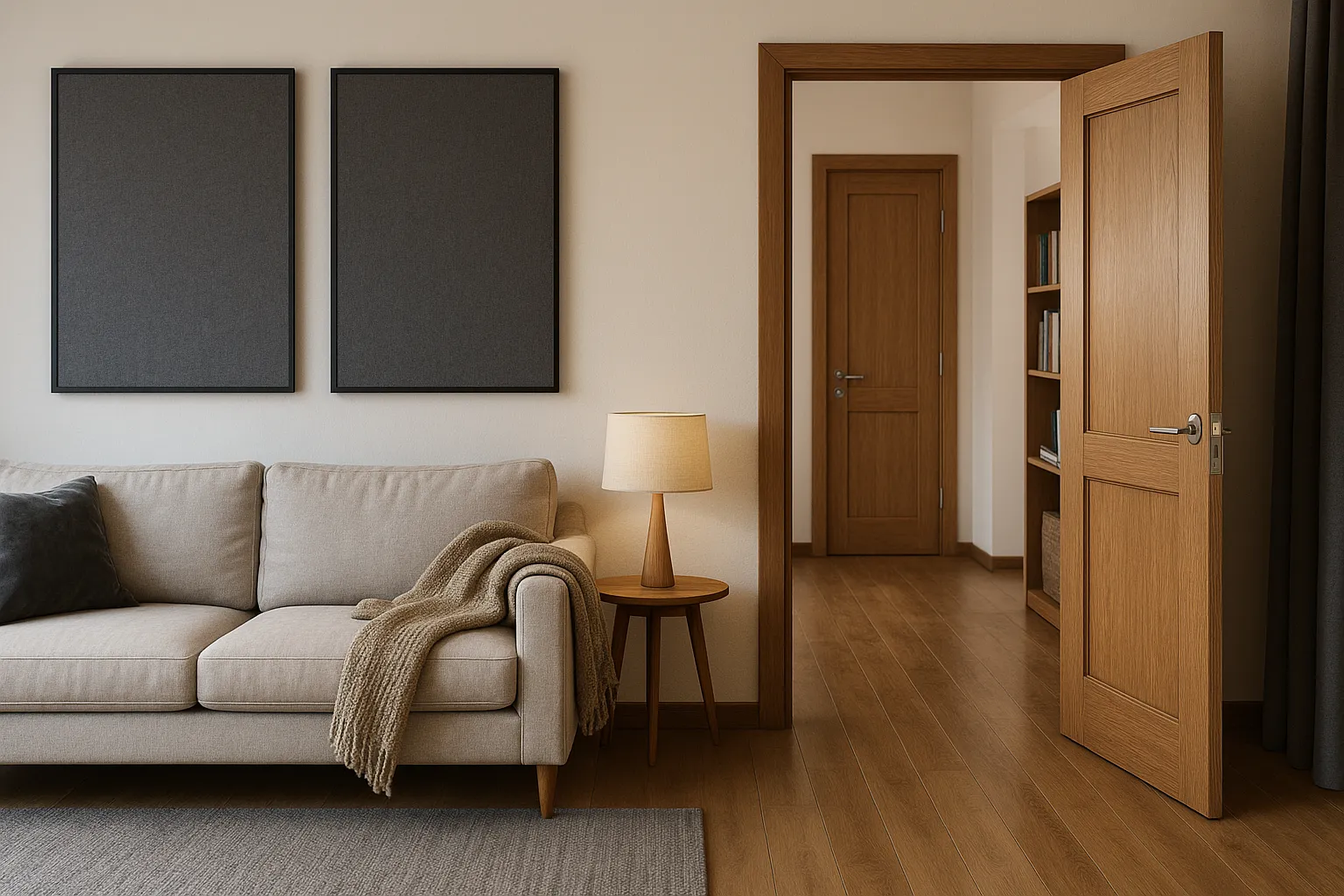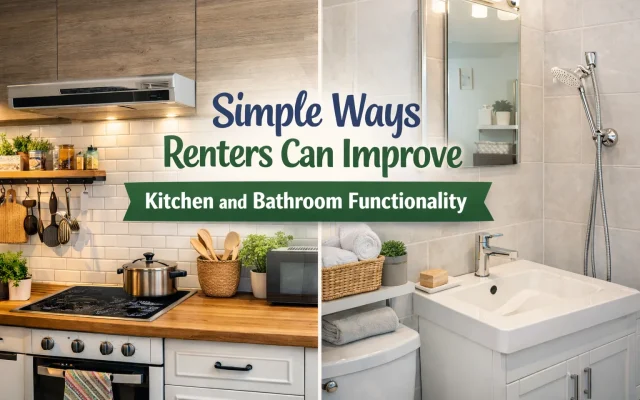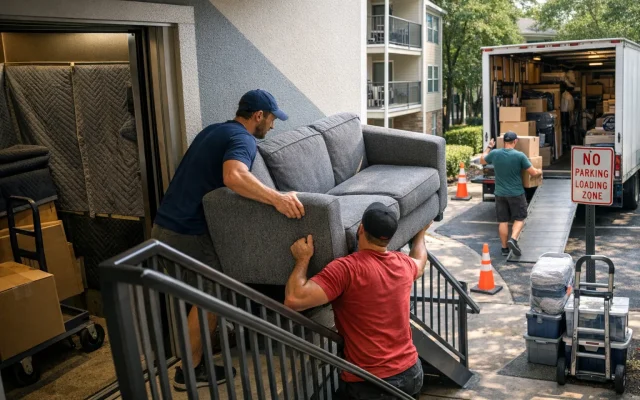You’ve just moved into an apartment that seemed perfect: great location, nice layout, plenty of natural light, and a reasonable rent.
Then… you hear the upstairs neighbor vacuuming at 11 PM and the one next to you cranked up Love Island like they’re deaf.
Modern construction is full of promises, but the reality is that most apartment buildings are still far from soundproof.
Annoying? Yes, but that’s the least of your issues.
Noise can mess with your sleep and make you super stressed 24/7. You’d think that developers figured out how to build walls that block out the noise properly, but here we are with our carpets, strategically placed pillows, fans, and earbuds. Pretending it’s all quiet.
Luckily, soundproofing isn’t a lost cause, and you can still fix some things without breaking your lease, or tearing down the walls, or rebuilding the ceiling – something simple as upgrading to a better-quality door can go a long way in reducing intrusive noise.
Let’s go into why!
Why Sounds Still Travel So Easily in Most Modern Apartments
‘Thin walls’ are NOT your problem.
There’s a big difference between soundproofing and sound absorption. Unfortunately, most apartments don’t do either very well.
Soundproofing is what keeps noise from the outside from getting in or the noise you make from getting out. Sound absorption, on the other hand, deals with the echo and bounce of sounds that are already in the room.
Apartment buildings are mostly designed to cover the bare minimum. They’re basically meeting building codes, and unless it’s premium real estate, it’s considered a waste. If the apartment owner later wants to increase sound absorption, they’ll have to renovate/invest in sound deadening or absorption (depending on how much they’re willing to spend).
This is why you’ll find flimsy partitions instead of dense walls and hollow-core interior doors that barely block a sneeze, let alone real noise. And if you add to that flat drywall and concrete surfaces, which reflect the sound instead of deadening it, it’s obvious why your place is always so noisy.
Older buildings (before 2000) usually had heavier materials like plaster and brick, but newer buildings use cheaper, thinner construction because that’s what the world is right now; it seems all about appearances, no substance whatsoever.
Anyway, this is why modern apartments look beautiful but sound awful.
What You Can Do About the Noise Without Breaking Your Lease
You’re not trying to turn your apartment into a recording booth; your only goal is to make everyday life less annoying. That means that you need an affordable, temporary fix because you’ll move out sooner or later.
Here’s what you can do.
Soft Furnishings and Layers of Fabric
One of the easiest ways to handle noise in an apartment is to add soft surfaces that absorb sounds.
This means thick rugs, layered curtains, fluffy furniture, wall hangings, and even blankets or tapestries. All this will reduce echo and make the way the sound bounces around softer.
If you have a shared wall that transmits every little sound, you can put a tall bookshelf filled with books against it or a canvas headboard. Neither will completely block the sound, but they’ll make a noticeable difference.
Weather-Stripping, Door Sweeps, and DIY Seals
It’s shocking how much sound sneaks in through tiny cracks and gaps around doors and frames, especially if you have hollow-core doors in your apartment (which is very likely). You can fix this on your own, with no power tools or permissions.
Peel-and-stick weather strips and under-door sweeps are cheap and easy to install. And once you move out, they’re a piece of cake to remove.
They work particularly well for bedroom and bathroom doors.
Acoustic Panels
Acoustic panels are an excellent option because they’re easy to use and they’re quite affordable. If you invest in premium options, you can find ones that look like art, which are amazing to serve as a multi-functional piece around the house. A plain acoustic panel might not be too attractive to look at; an art piece (usually) is.
You can get them in all kinds of sizes and colors, and you can stick them straight to your walls without damaging them.
Foam panels are the cheapest, but they look a bit ‘dorm room’ if you don’t plan it well. If you’re not too strapped for cash, go with aesthetic acoustic art panels.
They look decorative and absorb noise, too.
Either way, you can mount them with command strips or Velcro pads. They come right off when you need to remove them.
When to Talk to Your Landlord or Building Manager
If the noise goes beyond annoying and starts to sound almost like crumbling insulation or broken seals, that’s no longer something you can DIY.
Don’t frame it as a request for renovation, though; explain that the issue is affecting your comfort and makes you feel like you’re living in an unfinished unit.
The issue is with doors and windows, which is, again, not something for you to do. Still, feel free to suggest a good replacement solid-core door from a company such as Shank Door LLC. Buying doors from a door-focused company will (almost always) provide you with better quality and longer-lasting items when compared to doors bought at retail chains such as Walmart or Lowe’s.
You don’t want to end up with something cheaply made.
How to Choose the Right Door for Better Sound Reduction
Not all doors are built the same. If you’re considering upgrading your doors (or suggesting it to your landlord), knowing the difference helps you make the smartest, most cost-effective decision.
Types of Doors + Noise Blocking Ability:
| Door Type | Core Material | Noise Blocking Level | Pros | Cons |
| Hollow-Core Door | Cardboard honeycomb interior | Poor | Lightweight, inexpensive | Barely blocks sound, feels flimsy |
| Solid-Core Composite Door | Engineered wood interior | Good | Affordable upgrade, noticeably quieter | Heavier and slightly pricier |
| Solid Wood Door | Thick natural wood | Excellent | Strong sound-blocking and long-lasting | More expensive, very heavy |
| Acoustic-Rated Door | Specialized insulation & seals | Best | Maximum noise reduction | Typically requires professional installation and highest cost |
Quick Decision Tips:
- If you’re renting, go for a solid-core composite or request it from your landlord.
- If you own, and noise is a real problem, consider a solid wood or acoustic-rated door.
- No matter the door type, adding proper seals makes the biggest difference.
Additional Small Fixes That Make a Noticeable Difference
You don’t have to renovate to make your space quieter. Layering small, reversible steps can dramatically reduce how much noise gets in.
Simple Add-Ons That Help Immediately:
- Thick curtains or blackout drapes to reduce incoming noise from windows.
- Door sweep at the bottom of doors to block sound leaks.
- Peel-and-stick foam tape around door frames for tighter sealing.
- Large plush area rug in living spaces to absorb echo.
- Tall bookshelf against shared walls to add density and mass.
Placement Suggestions (Where Each Fix Works Best):
| Problem Area | Best Fixes | Why It Helps |
| Bedroom Door | Door sweep + weather stripping | Reduces hallway and neighbor noise |
| Shared Living Room Wall | Bookshelf + thick wall hangings | Adds mass and reduces sound transfer |
| Windows Facing Street | Blackout curtains or layered drapes | Absorbs outside noise and reduces echo |
| Echoey Rooms | Rugs + upholstered furniture | Soft surfaces dampen sound reflections |
Even small improvements stacked together can transform your space from loud and stressful to calm and comfortable.
Conclusion
If you want to live in a quiet place, nobody will think of you as arrogant or crazy. You have your home, and it’s THE palace where you want to feel safe and relaxed. And you can’t feel relaxed if you hear people murmuring on the outside, or cars driving by all the time.
Or if you live in an apartment building, you also have to think about your neighbors. Is someone watching Netflix with the volume glued to max, or did they decide to do some heavy cardio at 2 AM? If you have good sound isolation, you don’t care about those things. If you don’t have good isolation, then you want to get good sound isolation. It’s that simple.
Now, you know what to do and how to get there.
And, hey, if all else fails, there’s always white noise.
Frequently Asked Questions (FAQs)
Most modern apartments use lightweight materials that don’t block sound well, allowing noise to travel easily through walls, floors, and doors.
Soundproofing blocks noise from entering or leaving a space, while sound absorption reduces echo and sound reflection inside the room.
They’re often not thin, but the materials used are lightweight and hollow, which makes them poor at stopping sound.
Hollow-core doors are mostly empty on the inside, so they let sound pass through instead of blocking it.
Yes, soft surfaces absorb sound and reduce the echo that makes noise seem louder indoors.
Yes, many acoustic panels can be mounted using command strips or Velcro, making them removable.
They seal gaps where air and sound leak through, making the room more insulated and quieter.
Temporary, removable fixes usually don’t require permission, but permanent changes like new doors generally do.
Yes, switching to a solid-core door blocks far more noise than a standard hollow-core one.
Yes, especially if the noise suggests structural issues or poor sealing that affect comfort and livability.
They don’t stop the noise, but they can mask disruptive sounds and make them less noticeable.







